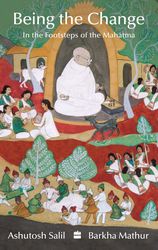Away from the beaten track, there are innumerable stories waiting to be told about men and women who are working as agents of change. In their work, the Mahatma's ideals live on, but their tales of perseverance remain largely untold.
Bureaucrat Ashutosh Salil and journalist, Barkha Mathur, in the course of their work, have come across many such unsung heroes.
In their new book, they tell the stories of seven social warriors who have stayed away from the limelight, despite their efforts to bring about positive changes in their community. Being the Change—In the Footsteps of the Mahatma takes a look at the work of these new-age Gandhians. The narration is immersive, since Salil and Mathur draw from their own work experiences.
These social crusaders have, through their selfless work, kept the Gandhian way of life alive in the Vidarbha region of Maharashtra, which the authors describe as their own 'karmabhoomi'. Then there is, of course, its special connection with Gandhi.
Take, for example, Ravindra and Smita Kolhe. The doctor couple have lived in the tiny hamlet of Bairagarh in Amravati for the last 35 years. The village, which had no electricity or medical facility and not even a ration shop, was specially chosen by Ravindra as the place where he wanted to work. The couple had to go through innumerable trials before the people of Bairagarh accepted their medical help.
There is also the story of Dr Satish Gogulwar and Subhada Deshmukh, who have been working amidst the tribal communities of Gadchiroli for the last three decades. The couple arrived in the area in 1984 along with their one-year-old son, and are credited with having brought health care and empowerment to Kurkheda and its neighbouring villages, about 150km from Nagpur. The self-help groups that they set up three decades ago are still going strong.
Then there is Matin Bhosale, who belongs to the denotified Phanse Pardhi tribe which faces stigma and discrimination for its reputation of being 'hereditary criminals'. His life's work has been centred on fighting for the education of the children from his community.
The book also chronicles the work of the third generation of Amtes—Digant and Aniket—who, along with their spouses, returned to Hemalkasa in Gadchiroli to carry on the work of their grandparents and parents.
The book is a befitting tribute to Gandhi and a celebration of the people who have chosen to follow in his footsteps today.
Being the Change―In the Footsteps of the Mahatma
By Ashutosh Salil and Barkha Mathur
Published by HarperCollins
Price Rs399; Pages 163


